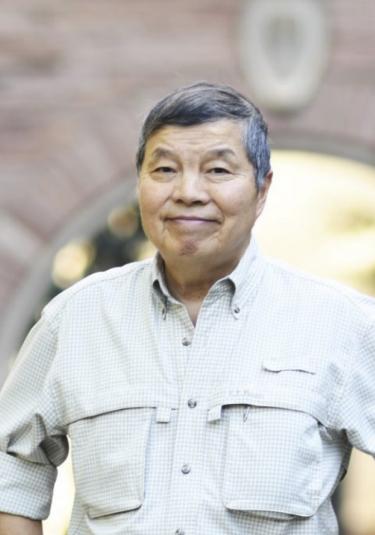House Speaker Nancy Pelosi recently visited Taiwan to tout America's commitment to Taiwanese security, fueling a mounting crisis between China and the United States.
Taiwan, officially known as the Republic of China (ROC), has been governed independently since 1949. But the mainland of China, known as the People's Republic of China (PRC), still considers the island part of its territory and views trips by foreign government officials to Taiwan as an acknowledgment of the island's sovereignty.
William Wei, a professor of modern Chinese history, spoke about the significance of Pelosi's visit and its implications on Chinese-American relations.

Professor William Wei
How long has there been this tension between China and the U.S.?
Tensions between China and the United States go back to the Cold War-a period of tension and hostility between the U.S. and its allies of Western democracies, and the Soviet Union and its satellite nations, which included the newly established People's Republic of China.
What we know now, but didn't then, is that there were tensions between the Soviet Union and China that eventually led to their split in 1960. We could have, and should have, taken advantage of these tensions between the Soviet Union and China, but instead, the U.S. saw China as an ally of the Soviet Union and acted accordingly.
So when the Korean War broke out in the summer of 1950, the U.S. saw this as Soviet-supported aggression and the expansion of communism that threatened American national security. The U.S. intervened by inserting the American Seventh Fleet in the Taiwan Strait, preventing the Chinese communists from invading Taiwan.
Ever since then, the U.S. has supported the Taiwanese government.
Why is Taiwan so important to China? And what does the U.S. have to do with it?
China views Taiwan as a renegade province that needs to be reintegrated into the homeland. This has been a major priority for PRC President Xi Jinping, who hopes to unify the country by bringing places such as Hong Kong and Taiwan back into the fold.
The problem is that other countries, especially the U.S., have interfered in this process of reintegration, which is viewed as challenging China's sovereignty as a nation. China's history has recorded what they call a "century of humiliation," in which they've had to endure this interference in its internal affairs by foreign nations, and they certainly feel the need to never repeat this experience.
Why does Pelosi's visit to Taiwan elevate these tensions?
Nancy Pelosi, who is an ardent opponent of China and a critic of China's human rights abuses, is the highest-ranking U.S. official to visit China since Newt Gingrich visited in 1997. The problem is the Chinese see Pelosi's visit as giving legitimacy to the Taiwanese government, and aiding and abetting those who seek an independent Taiwan.
China also feels Pelosi's visit might encourage other nations to normalize relations with Taiwan, undermining China's efforts to isolate the province diplomatically and economically.
How can the U.S. navigate through this current uprising and mounting tensions?
Tensions between China and the U.S. could very well lead to a military conflict, and this is something we have to avoid at all costs. We need to put steps in place to avoid confrontation and de-escalate tensions should there be a confrontation.
To establish this kind of trust between nations, both the U.S. and China need to regularly provide assurances to each other that they intend to maintain the status quo. For the U.S., that means reaffirming its One China policy, and that it will stay within the bounds of the Taiwan Relations Act of 1979. For China, that means reaffirming its policy of resolving the Taiwan issue peacefully.
Both countries must avoid falling prey to political pressures and engaging in political posturing. One of the things we all have to agree on is that war is never a solution. So there must be measures in place to avoid mistakes and misunderstandings on the ground that could lead to a military confrontation.
How might these tensions adversely affect the Chinese-American population?
Unfortunately, tensions between China and the United States have often resulted in adverse effects on Chinese Americans and Asian Pacific Americans in general. Whenever there are tensions, it invariably leads to the resurrection of the "Yellow Peril" myth-that China, or Asia, is a direct threat to the United States, and that Chinese Americans are agents of China.
In 1999, there was the case of Wen Ho Lee, which was an example of racial scapegoating and racial profiling. Since then, we've had more recent cases of racial bias in the investigation, charging and prosecution of Asian Americans. Some of this has been a result of the Justice Department's 2018 China initiative, which prosecutes Chinese scientists suspected of engaging in espionage without evidence or even probable cause.
This also happened with the recent pandemic, with the assumption that China was to blame for COVID-19, and that Chinese Americans were carriers of the disease. And because of the inability to distinguish Chinese from other Asian Pacific Americans, a lot of these anti-Chinese incidents have affected other Asian communities.
But we can certainly learn a lot from the past, as we should, because it informs our understanding of the present, and helps us to prepare for an uncertain future.
How will this impact future relations with China?
Fortunately, as we already know, Pelosi's visit did not necessarily lead to direct military conflict. However, it is clear that the visit will, at the very least, undermine President Biden's efforts to improve bilateral relations with China.
This could jeopardize our relationship with China just as the U.S. needs its help-in ending, for example, Russia's invasion of Ukraine.






